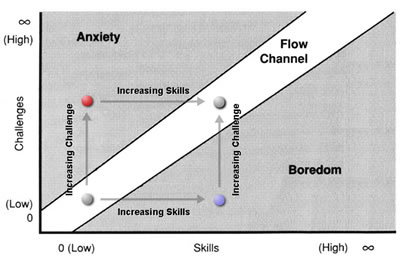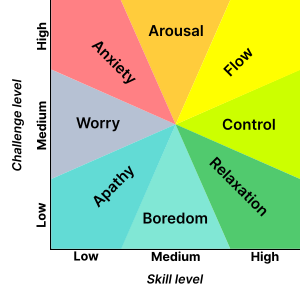
How many times have you sat down to do something and suddenly you look up at the clock and time seems to have slipped away from you and suddenly you realize that you have spent hours working on something but it felt like 10 minutes of time passed. Time flies when you are having fun, is how my mum would summarize this effect. Well it seems that these moments can be attributed to being in a certain mindset and when certain conditions are met these moments are repeatable.
Mihaly Csikszentmihalyi a Hungarian psychology professor has studied these moments of "flow" as he calls them and has outlined the criteria for them to occur. Here are 7 things that will help you find your flow moments.
1. The task has to have a chance of being complete-able
2. You should have time set aside for concentrating on the task without distraction
3. The task needs to have clear goals, so you know what you are aiming to work on
4. It helps to have immediate feedback, so you know how things are progressing
5. Having deep but effortless involvement, will help reduce worries that may inhibit progress
6. You need to have a sense of control over the outcome of what you are working on
7. It helps to not have a conscious reminder of time, then time will cease to have meaning.
Flow moments facilitate concentration, by making everyday activities distinct and meaningful from normal everyday activities. They also make control possible giving a sense of self fulfillment. These moments are very similar in characteristics to what Daniel Pink, would refer to as "Drive" the motivational factors for intrinsic desires in performing any cognitive tasks. Daniel suggests in his book, that people are inspired to work harder at cognitive tasks when they are aiming to fulfill 3 fundamental needs, mastery, purpose and autonomy. This to me falls inline with what finding flow is all about. That sense of being inspired to increase ones level of mastery, with a sense of control and with some guiding purpose.
Flow moments require:
1. Rules (not too open ended)
2. Require learning new skills (mastery)
3. Set up goals ( have purpose)
4. provide feedback (sense of achievement)
This concept is nicely summarized visually in a couple of graphs. The first show the channel of flow, between anxiety of a task being to hard, but challenging enough to make us work at it, and boredom from a skills stand point that the task it too trivial that it doesn't challenge us enough and is uninspiring.

The other graph shows a more granular break down of the states of mind that occur around the flow channel.

So next time you start into a project and the time disappeared all too quickly, thin to yourself what made that happen and how you may go about making it happen again. Try to make every working moment a flow moment and your sense of purpose and self fulfillment will surely grow.

